八年级英语下册Unit 1 Past and Present Grammar 课件(共49张PPT)
文档属性
| 名称 | 八年级英语下册Unit 1 Past and Present Grammar 课件(共49张PPT) | 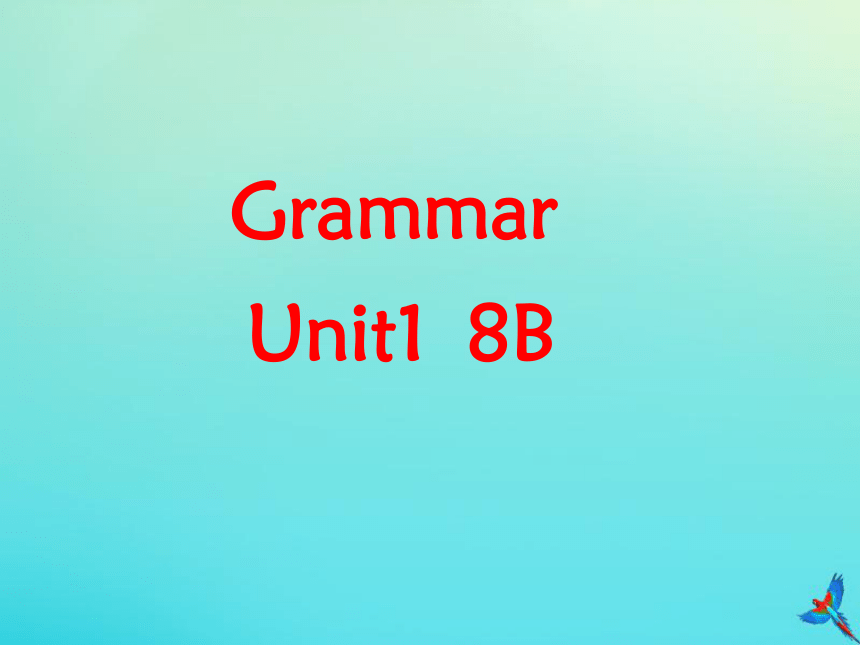 | |
| 格式 | zip | ||
| 文件大小 | 2.5MB | ||
| 资源类型 | 教案 | ||
| 版本资源 | 牛津译林版 | ||
| 科目 | 英语 | ||
| 更新时间 | 2020-03-18 15:17:18 | ||
图片预览

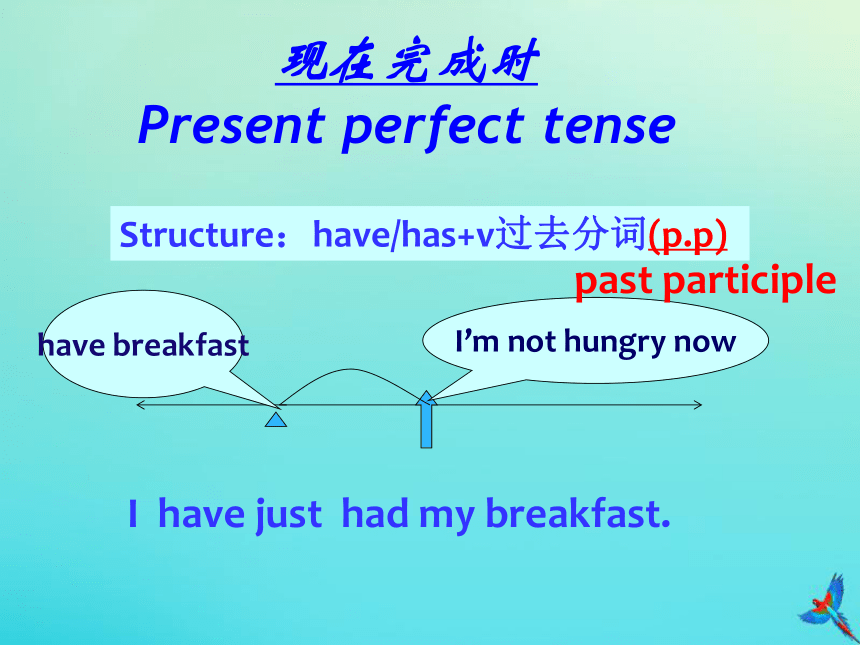
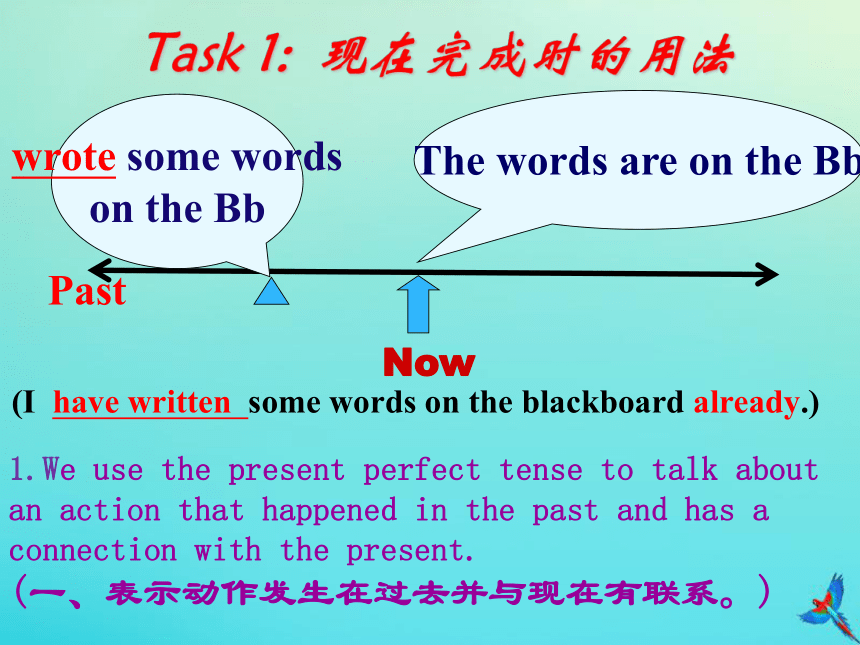

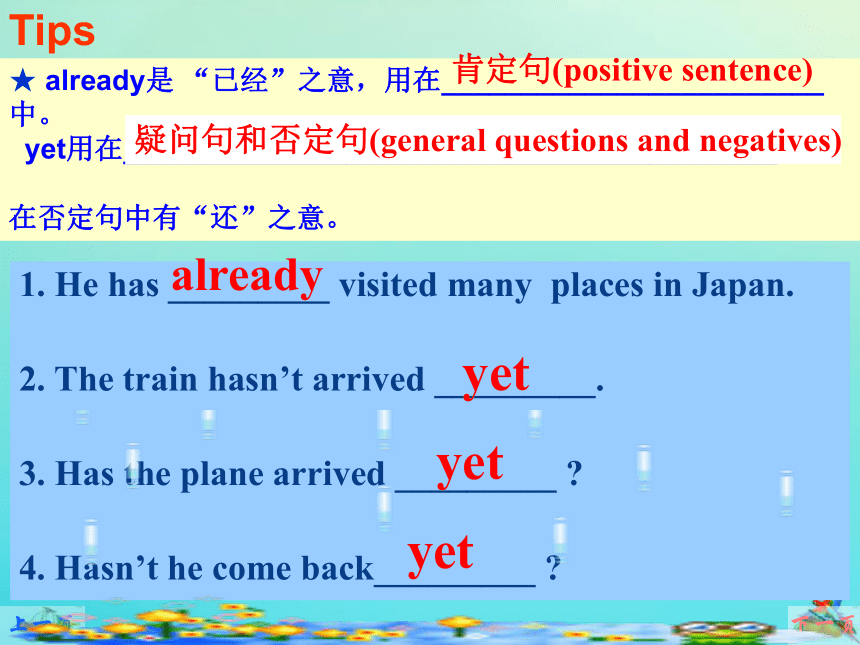

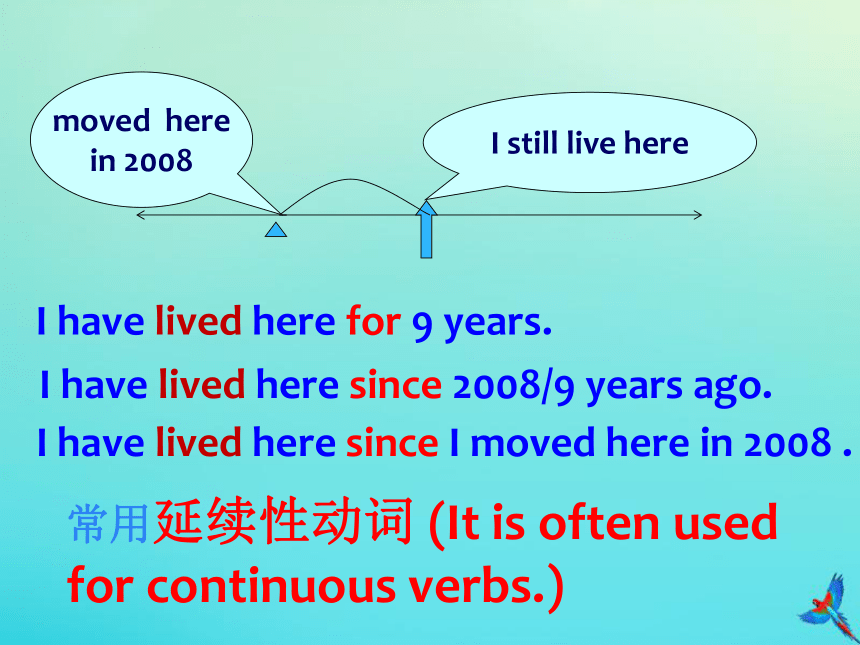

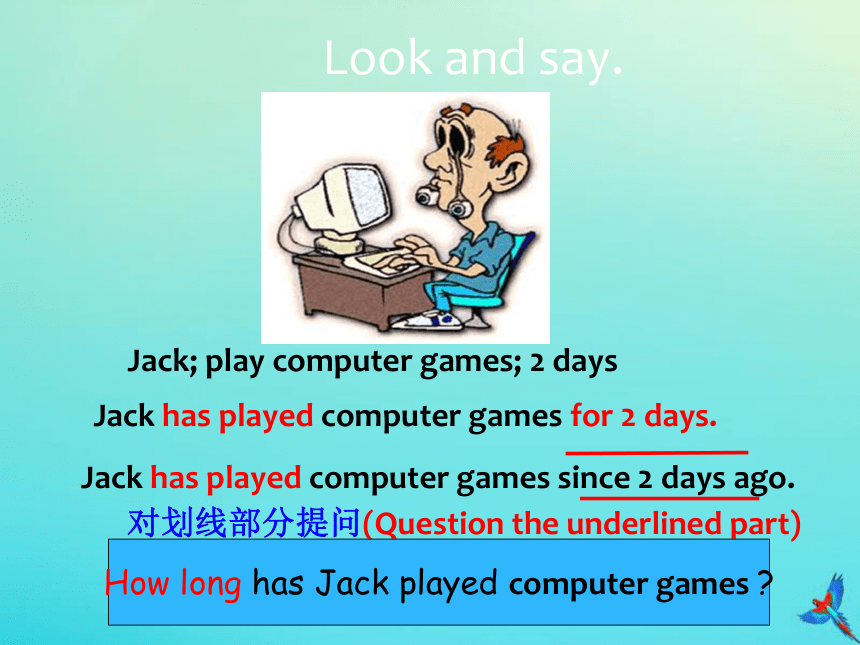
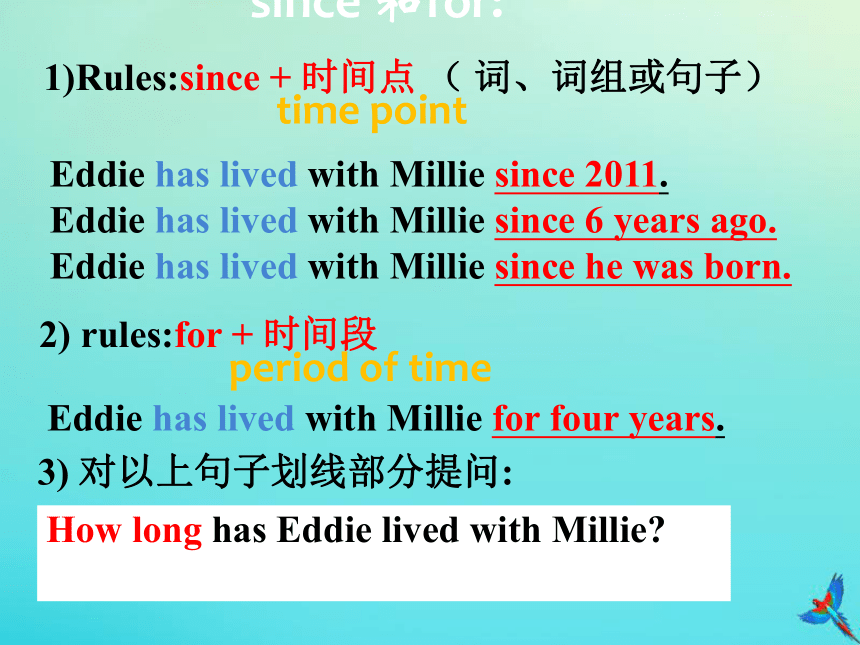
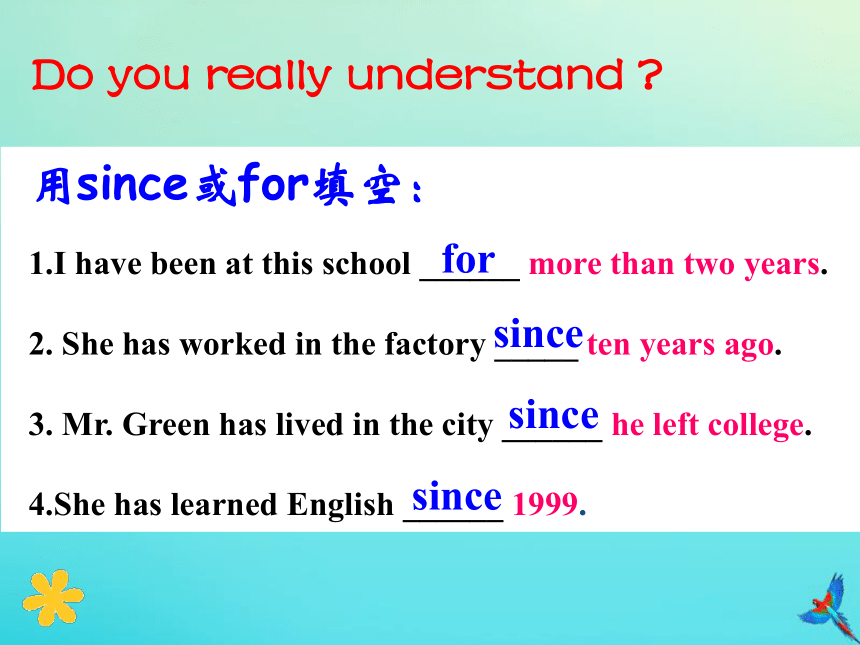

文档简介
(共49张PPT)
Grammar
Unit1 8B
现在完成时
Present perfect tense
Structure:have/has+v过去分词(p.p)
have breakfast
I have just had my breakfast.
I’m not hungry now
past participle
Task 1: 现在完成时的用法
1.We use the present perfect tense to talk about
an action that happened in the past and has a connection with the present.
(一、表示动作发生在过去并与现在有联系。)
wrote some words
on the Bb
The words are on the Bb
Now
Past
(I have written some words on the blackboard already.)
Have a try: “already”or “ yet”
1. He has ________ visited many ?places in China.
2. Lily has had breakfast ___________.
3.Has she arrived _______??
4. The train hasn't arrived __________.
already
already
yet
yet
注意 "already" 在句中的两种位置.
Notice the word “already”in the two sentences
1. He has _________ visited many ?places in Japan.
?? ?
2. The train hasn’t arrived _________.
3. Has the plane arrived _________ ? ?
4. Hasn’t he come back_________ ?
上一页
下一页
Tips
★ already是 “已经”之意,用在________________________中。
yet用在_________________________________________中,
在否定句中有“还”之意。
already
yet
yet
yet
肯定句(positive sentence)
疑问句和否定句(general questions and negatives)
现在完成时的用法(二)
I have been a teacher since I left my college(大学).
I became a teacher.
I am still a teacher.
Now
Past
Future
We use the present perfect tense to talk about
an action that started in the past and continues
to the present.(表示过去已经开始持续到现在或将来
的动作或状态。)
I have been a teacher for about 20 years.
moved here
in 2008
I still live here
I have lived here for 9 years.
I have lived here since 2008/9 years ago.
I have lived here since I moved here in 2008 .
常用延续性动词 (It is often used for continuous verbs.)
Look and say.
The pig ; swim; three hours
The pig has swum for three hours.
The pig has swum since three hours ago.
Look and say.
Jack; play computer games; 2 days
Jack has played computer games for 2 days.
对划线部分提问(Question the underlined part)
Jack has played computer games since 2 days ago.
How long has Jack played computer games ?
since 和for:
Eddie has lived with Millie since 2011.
Eddie has lived with Millie since 6 years ago.
Eddie has lived with Millie since he was born.
1)Rules:since + 时间点 ( 词、词组或句子)
Eddie has lived with Millie for four years.
2) rules:for + 时间段
3) 对以上句子划线部分提问:
How long has Eddie lived with Millie?
time point
period of time
Do you really understand ?
用since或for填空:
1.I have been at this school ______ more than two years.
2. She has worked in the factory _____ ten years ago.
3. Mr. Green has lived in the city ______ he left college.
4.She has learned English ______ 1999.
for
since
since
since
We also use the present perfect tense to talk about how many times an action has happened till now .
表示某事直到现在已经发生了多次.
I have watched the TV play many times.
现在完成时用法(三)
We often use :
ever 曾经(疑问句, have/has后)
你读过这本书吗?
Have you ever read this book?
never从来没有(否定, have/has后)
我从没看过这部电影。
I have never watched this film.
“ever ”or “ never ” ?
—Have you______ seen the film?
—No. I have _______seen it.
ever
never
选择never, ever填空。
Key words
yet
ever
never
since
for
just
already
recently
remember them!
(1)already “已经”,放在肯定句句中或句末;
(2)yet放在疑问句句尾时,表示“已经”;
放在否定句句尾时,表示“还(没,不)”
常用的时间状语区别
The differences between
the usual temporal adverbials
(3)ever “曾经”,用于疑问句或否定句中;
(4)never “从来没有”,表示否定句中。
(5)just “刚刚”,用于陈述句中;
(6)recently “近来”,用于句末。
①I have ____ come back from the supermarket.(for, just, since)
②I have ___been to Chengdu.(for, never, yet)
③He has worked there_____ he left school.(already,just, since)
④He has known Sam_____nine years.(for, never, since)
⑤Have you _____ridden a horse?(ever, for, yet)
Have you really understood?
Complete the sentences with correct words.
_
Task 2:
The Present Perfect Tense
(现在完成时态)
基本结构(Basic structure):
have/has +P.P(past participle)
We _________(live)in Jingsha since we were born.
for 14 years.
have lived
We ____________(study) here since 2015.
for 2 years.
have studied
肯定式(positive form): have/has +p.p
not change a lot
Let’s have a try
the students
The students ________________ a lot.
haven’t changed
=have not
否定形式:negative form
Let’s practise
Lucy has finished her homework.(否定句)
Lucy _____ _____finished her homework.
has
not
=hasn’t
Work out the rule
How to make negative sentences(如何变否定句)?
只需要在___________ 后 加上_________ 即可。
have或has
not
have not= haven’t
has not = hasn’t
?
I have watched the TV play many times.
Have you watched the TV play many times?
Yes, I have.
No, I haven’t.
一般疑问句(general quention)
We ask and answer questions in the
present perfect tense like this:
Let’s practise
We have cleaned the classroom.
(一般疑问句,并做肯定和否定回答)
_____ you ________ the classroom?
Yes,______ ______.
No, ______ _______.
Have
cleaned
we
have
we
haven’t.
Let’s practise
Lucy has finished her homework.
(一般疑问句,并做肯定和否定回答)
_____ Lucy ________ her homework?
Yes,______ ______.
No, ______ _______.
Has
finished
she
has
she
hasn’t.
The Present Perfect Tense (现在完成时)
一般疑问式:
将 have/has提前到句首
Work out the rule!
回答:
肯定:
否定:
Yes, …have/has.
No, …haven’t/hasn’t.
如何变一般疑问句?
只需把___________ 提到_____,其余______即可。
注意:第____ 人称变第___ 人称。
have或has
句首
照抄
一
二
Let’s try!
1. She has already cleaned the kitchen. (改为否定句)
→She __________ cleaned the kitchen ___________.
2. They have visited some interesting places in China. (一般疑问句)
→________ they ___________ ______interesting places in China?
3. The poor dog has died.(改为一般疑问句并作否定回答)
→_______the poor dog ______? -No, it __________.
4. I have ever been to the Great Wall. (改为否定句)
→ I ________ ________ been to the Great Wall.
5. They have studied here since they moved to the city. (对划线部分提问)
→ ________ _______ _______they _________ here?
hasn’t yet
Have visited any
Has died hasn’t
have never
How long have studied
Task 3:动词的过去分词的构成
The constituent of the past participle
过去分词(P.P.)
love
like
Regular verbs:过去式和过去分词的构成:
visit
repair
watch
visited visited
repaired repaired
watched watched
loved loved
liked liked
verb+ed
(directly add “ed”)
以不发音的e
结尾+d
(with unpronounceable
“e”,add“d”)
mop
plan
mopped mopped
planned planned
注:以一个辅音字母结尾的重读闭音节词, 双写最后一个辅音字母+ed
(A stressed,cloused syllabe with a consonant, double write the last consonant letter and add”ed”
双写+ed
(double write “ed”
study
hurry
studied studied
hurried hurried
去y+ied
注:以辅音字母加y结尾的词,去y+ied.
(End with the consonant letter plus “y”,go to “y”,add :ied”
Type original Past tense (p.p)
cost cost cost
come came come
run ran run
get got got
catch caught caught
see saw seen
forget forgot forgotten
drink drank drunk
grow grew grown
eat ate eaten
ABB
AAA
ABC
ABA
Irregular verbs:过去式和过去分词的构成:
Let me test your memory !
写出下列动词的过去分词
live
finish
try
plan
hit
meet
put
catch
Chat time (p 14):
Millie: (1)_____ you ______(see) any films recently, Sandy?
Sandy: No, I haven’t. What about you?
Millie: I (2)________(see) one last Saturday.
Sandy: What’s it about?
Millie: It’s about the changes in Beijing over the past century.
From the film, I (3)______________(learn) more about
Beijing’s past and present.
Sandy: Oh, I think I (4)__________(hear) about the film. Do you
plan to see it again
Millie: Yes, I’d like to
Have seen
saw
have learnt
have heard
Complete the following sentences with the present perfect tense:
1.They ______________(finish) their homework already.
2. John _______ never _______ (visit) China.
3. Mr Li ______________(repair) over ten bicycles
since Monday.
4. We ________________(not see) each other for years.
5. My parents ______________(not come) back yet.
6. Our teacher _____________(teach) us a lot about the
history of China recently(最近,近来).
have finished
has visited
has repaired
haven’t seen
haven’t come
has taught
Task 4:现在完成时的时间状语
(Temporal adverbials in the present perfect tense)
Basic Structure
The main usage
Temporal adverbials
The constituent of P.P
Summary: The Present Perfect Tense
一、表示动作发生在过去并与现在有联系或影响
eg. I’ve just finished my work.
二、表示过去已经开始持续到现在或将来的动作或状态
eg. He’s worked here for about ten years.
since ten years ago.
since he came here.
三、表示某事直到现在已经发生了多次
eg. We’ve visited Beijing several times.
现在完成时的主要用法
(the main usage)
①陈述句:
主语+have/has+P.P+其他
②否定句:
主语+have/has+not+P.P+其他
③一般疑问句及肯否定回答:
Have/Has+主语+P.P+其他
④特殊疑问句:
特殊疑问词+have/has+主语+P.P+其他
现在完成时的基本构成(basic structure)
I、Regular verbs:过去式和过去分词的构成:
1).verb+ed
2).以不发音的e结尾+d
3).以一个辅音字母结尾的重读闭音节词, 双写最后一个辅音字母+ed,双写+ed
4).以辅音字母加y结尾的词,去y+ied.
II、Irregular verbs:four types
AAA ABA ABB ABC
过去分词的构成
(the constituent)
1.already “已经”,放在肯定句句中或句末;
2.yet放在疑问句句尾时,表示“已经”;
放在否定句句尾时,表示“还(没,不)”
现在完成时的时间状语
(temporal adverbials)
3.ever “曾经”,用于疑问句或否定句中;
4.never “从来没有”,表示否定句中。
5.just “刚刚”,用于陈述句中;
6.recently “近来”,用于句末。
现在完成时与一般过去时的区别
I bought a new computer last week.——只强调动作发生在过去。
I have bought a new computer.——不强调动作什么时候发生,只强调现在的结果是拥有了一台新电脑。
1)一般过去时表示过去某时发生的动作或单纯叙述过去的事情,强调动作,和现在不发生关系。
而现在完成时表示过去发生的某一动作对现在造成的影响或结果,强调的是现在的情况。
2)一般过去时常与具体的时间状语连用,而现在完成时通常与模糊的时间状语连用,或无时间状语,不能与表示过去的时间连用。
◎ 一般过去时的时间状语有:yesterday, last week,…ago, in1980, in October, just now等具体的时间状语。
◎ 现在完成时的时间状语有:for, since, ever, never, just, already, yet等不确定的时间状语。
Let’s try! I’m sure you can do it well!
1.I _________(see) the 3D film Avatar.
It’s amazing!
I _________(see) it one month ago.
2.--Is your grandfather still alive?
--No, he _____already ______(die).
--When _______he _______(die)?
--He _______last year(die).
3.Mr. Li _______(begin) to work in this factory
in 1990.
He ___________ (work) in the factory
for 20 years.
have seen
saw
has died
did die
died
began
has worked
1.— _______ you ever _______ with a
group?
— Yes, I have.
A. Did; study B. Are; studying
C. Were; studying D. Have; studied
2. — Lucy, _____ you ____ your ticket?
— Not yet.
A. did; find B. have; found
C. has; found D. do; find
Multiple choice.
3. My grandmother ______ a lot of
changes in Tianjin since she came here.
A. sees B. can see
C. will see D. has seen
4. My aunt is a writer. She ______ more
than ten books since 1980.
A. writes B. wrote
C. has written D. will write
5. — Why won’t you go to the movie with
me, Gina?
— Because I ______ it twice.
A. see B. have seen
C. saw D. will see
6. — China develops so fast.
— That’s true. It ______ a lot already.
A. changes B. changed
C. will change D. has changed
7. Julia isn’t going to the cinema with us
because she ______ the film.
A. sees?? ?? B. saw?? ??
C. will see??? ?? D. has seen
8. — Look at these stamps. I _______
them for five years.
??? — Wow, they are wonderful.
?? A. kept??????? B. have kept??????????
C. have bought D. keep
Homework
1. Review the structure and usage
of the present perfect tense.
2. Resite the irregular past participle
verbs learned in this class.
3.Preview the part of Integrated skills.
Thank you
Cass is over.
Grammar
Unit1 8B
现在完成时
Present perfect tense
Structure:have/has+v过去分词(p.p)
have breakfast
I have just had my breakfast.
I’m not hungry now
past participle
Task 1: 现在完成时的用法
1.We use the present perfect tense to talk about
an action that happened in the past and has a connection with the present.
(一、表示动作发生在过去并与现在有联系。)
wrote some words
on the Bb
The words are on the Bb
Now
Past
(I have written some words on the blackboard already.)
Have a try: “already”or “ yet”
1. He has ________ visited many ?places in China.
2. Lily has had breakfast ___________.
3.Has she arrived _______??
4. The train hasn't arrived __________.
already
already
yet
yet
注意 "already" 在句中的两种位置.
Notice the word “already”in the two sentences
1. He has _________ visited many ?places in Japan.
?? ?
2. The train hasn’t arrived _________.
3. Has the plane arrived _________ ? ?
4. Hasn’t he come back_________ ?
上一页
下一页
Tips
★ already是 “已经”之意,用在________________________中。
yet用在_________________________________________中,
在否定句中有“还”之意。
already
yet
yet
yet
肯定句(positive sentence)
疑问句和否定句(general questions and negatives)
现在完成时的用法(二)
I have been a teacher since I left my college(大学).
I became a teacher.
I am still a teacher.
Now
Past
Future
We use the present perfect tense to talk about
an action that started in the past and continues
to the present.(表示过去已经开始持续到现在或将来
的动作或状态。)
I have been a teacher for about 20 years.
moved here
in 2008
I still live here
I have lived here for 9 years.
I have lived here since 2008/9 years ago.
I have lived here since I moved here in 2008 .
常用延续性动词 (It is often used for continuous verbs.)
Look and say.
The pig ; swim; three hours
The pig has swum for three hours.
The pig has swum since three hours ago.
Look and say.
Jack; play computer games; 2 days
Jack has played computer games for 2 days.
对划线部分提问(Question the underlined part)
Jack has played computer games since 2 days ago.
How long has Jack played computer games ?
since 和for:
Eddie has lived with Millie since 2011.
Eddie has lived with Millie since 6 years ago.
Eddie has lived with Millie since he was born.
1)Rules:since + 时间点 ( 词、词组或句子)
Eddie has lived with Millie for four years.
2) rules:for + 时间段
3) 对以上句子划线部分提问:
How long has Eddie lived with Millie?
time point
period of time
Do you really understand ?
用since或for填空:
1.I have been at this school ______ more than two years.
2. She has worked in the factory _____ ten years ago.
3. Mr. Green has lived in the city ______ he left college.
4.She has learned English ______ 1999.
for
since
since
since
We also use the present perfect tense to talk about how many times an action has happened till now .
表示某事直到现在已经发生了多次.
I have watched the TV play many times.
现在完成时用法(三)
We often use :
ever 曾经(疑问句, have/has后)
你读过这本书吗?
Have you ever read this book?
never从来没有(否定, have/has后)
我从没看过这部电影。
I have never watched this film.
“ever ”or “ never ” ?
—Have you______ seen the film?
—No. I have _______seen it.
ever
never
选择never, ever填空。
Key words
yet
ever
never
since
for
just
already
recently
remember them!
(1)already “已经”,放在肯定句句中或句末;
(2)yet放在疑问句句尾时,表示“已经”;
放在否定句句尾时,表示“还(没,不)”
常用的时间状语区别
The differences between
the usual temporal adverbials
(3)ever “曾经”,用于疑问句或否定句中;
(4)never “从来没有”,表示否定句中。
(5)just “刚刚”,用于陈述句中;
(6)recently “近来”,用于句末。
①I have ____ come back from the supermarket.(for, just, since)
②I have ___been to Chengdu.(for, never, yet)
③He has worked there_____ he left school.(already,just, since)
④He has known Sam_____nine years.(for, never, since)
⑤Have you _____ridden a horse?(ever, for, yet)
Have you really understood?
Complete the sentences with correct words.
_
Task 2:
The Present Perfect Tense
(现在完成时态)
基本结构(Basic structure):
have/has +P.P(past participle)
We _________(live)in Jingsha since we were born.
for 14 years.
have lived
We ____________(study) here since 2015.
for 2 years.
have studied
肯定式(positive form): have/has +p.p
not change a lot
Let’s have a try
the students
The students ________________ a lot.
haven’t changed
=have not
否定形式:negative form
Let’s practise
Lucy has finished her homework.(否定句)
Lucy _____ _____finished her homework.
has
not
=hasn’t
Work out the rule
How to make negative sentences(如何变否定句)?
只需要在___________ 后 加上_________ 即可。
have或has
not
have not= haven’t
has not = hasn’t
?
I have watched the TV play many times.
Have you watched the TV play many times?
Yes, I have.
No, I haven’t.
一般疑问句(general quention)
We ask and answer questions in the
present perfect tense like this:
Let’s practise
We have cleaned the classroom.
(一般疑问句,并做肯定和否定回答)
_____ you ________ the classroom?
Yes,______ ______.
No, ______ _______.
Have
cleaned
we
have
we
haven’t.
Let’s practise
Lucy has finished her homework.
(一般疑问句,并做肯定和否定回答)
_____ Lucy ________ her homework?
Yes,______ ______.
No, ______ _______.
Has
finished
she
has
she
hasn’t.
The Present Perfect Tense (现在完成时)
一般疑问式:
将 have/has提前到句首
Work out the rule!
回答:
肯定:
否定:
Yes, …have/has.
No, …haven’t/hasn’t.
如何变一般疑问句?
只需把___________ 提到_____,其余______即可。
注意:第____ 人称变第___ 人称。
have或has
句首
照抄
一
二
Let’s try!
1. She has already cleaned the kitchen. (改为否定句)
→She __________ cleaned the kitchen ___________.
2. They have visited some interesting places in China. (一般疑问句)
→________ they ___________ ______interesting places in China?
3. The poor dog has died.(改为一般疑问句并作否定回答)
→_______the poor dog ______? -No, it __________.
4. I have ever been to the Great Wall. (改为否定句)
→ I ________ ________ been to the Great Wall.
5. They have studied here since they moved to the city. (对划线部分提问)
→ ________ _______ _______they _________ here?
hasn’t yet
Have visited any
Has died hasn’t
have never
How long have studied
Task 3:动词的过去分词的构成
The constituent of the past participle
过去分词(P.P.)
love
like
Regular verbs:过去式和过去分词的构成:
visit
repair
watch
visited visited
repaired repaired
watched watched
loved loved
liked liked
verb+ed
(directly add “ed”)
以不发音的e
结尾+d
(with unpronounceable
“e”,add“d”)
mop
plan
mopped mopped
planned planned
注:以一个辅音字母结尾的重读闭音节词, 双写最后一个辅音字母+ed
(A stressed,cloused syllabe with a consonant, double write the last consonant letter and add”ed”
双写+ed
(double write “ed”
study
hurry
studied studied
hurried hurried
去y+ied
注:以辅音字母加y结尾的词,去y+ied.
(End with the consonant letter plus “y”,go to “y”,add :ied”
Type original Past tense (p.p)
cost cost cost
come came come
run ran run
get got got
catch caught caught
see saw seen
forget forgot forgotten
drink drank drunk
grow grew grown
eat ate eaten
ABB
AAA
ABC
ABA
Irregular verbs:过去式和过去分词的构成:
Let me test your memory !
写出下列动词的过去分词
live
finish
try
plan
hit
meet
put
catch
Chat time (p 14):
Millie: (1)_____ you ______(see) any films recently, Sandy?
Sandy: No, I haven’t. What about you?
Millie: I (2)________(see) one last Saturday.
Sandy: What’s it about?
Millie: It’s about the changes in Beijing over the past century.
From the film, I (3)______________(learn) more about
Beijing’s past and present.
Sandy: Oh, I think I (4)__________(hear) about the film. Do you
plan to see it again
Millie: Yes, I’d like to
Have seen
saw
have learnt
have heard
Complete the following sentences with the present perfect tense:
1.They ______________(finish) their homework already.
2. John _______ never _______ (visit) China.
3. Mr Li ______________(repair) over ten bicycles
since Monday.
4. We ________________(not see) each other for years.
5. My parents ______________(not come) back yet.
6. Our teacher _____________(teach) us a lot about the
history of China recently(最近,近来).
have finished
has visited
has repaired
haven’t seen
haven’t come
has taught
Task 4:现在完成时的时间状语
(Temporal adverbials in the present perfect tense)
Basic Structure
The main usage
Temporal adverbials
The constituent of P.P
Summary: The Present Perfect Tense
一、表示动作发生在过去并与现在有联系或影响
eg. I’ve just finished my work.
二、表示过去已经开始持续到现在或将来的动作或状态
eg. He’s worked here for about ten years.
since ten years ago.
since he came here.
三、表示某事直到现在已经发生了多次
eg. We’ve visited Beijing several times.
现在完成时的主要用法
(the main usage)
①陈述句:
主语+have/has+P.P+其他
②否定句:
主语+have/has+not+P.P+其他
③一般疑问句及肯否定回答:
Have/Has+主语+P.P+其他
④特殊疑问句:
特殊疑问词+have/has+主语+P.P+其他
现在完成时的基本构成(basic structure)
I、Regular verbs:过去式和过去分词的构成:
1).verb+ed
2).以不发音的e结尾+d
3).以一个辅音字母结尾的重读闭音节词, 双写最后一个辅音字母+ed,双写+ed
4).以辅音字母加y结尾的词,去y+ied.
II、Irregular verbs:four types
AAA ABA ABB ABC
过去分词的构成
(the constituent)
1.already “已经”,放在肯定句句中或句末;
2.yet放在疑问句句尾时,表示“已经”;
放在否定句句尾时,表示“还(没,不)”
现在完成时的时间状语
(temporal adverbials)
3.ever “曾经”,用于疑问句或否定句中;
4.never “从来没有”,表示否定句中。
5.just “刚刚”,用于陈述句中;
6.recently “近来”,用于句末。
现在完成时与一般过去时的区别
I bought a new computer last week.——只强调动作发生在过去。
I have bought a new computer.——不强调动作什么时候发生,只强调现在的结果是拥有了一台新电脑。
1)一般过去时表示过去某时发生的动作或单纯叙述过去的事情,强调动作,和现在不发生关系。
而现在完成时表示过去发生的某一动作对现在造成的影响或结果,强调的是现在的情况。
2)一般过去时常与具体的时间状语连用,而现在完成时通常与模糊的时间状语连用,或无时间状语,不能与表示过去的时间连用。
◎ 一般过去时的时间状语有:yesterday, last week,…ago, in1980, in October, just now等具体的时间状语。
◎ 现在完成时的时间状语有:for, since, ever, never, just, already, yet等不确定的时间状语。
Let’s try! I’m sure you can do it well!
1.I _________(see) the 3D film Avatar.
It’s amazing!
I _________(see) it one month ago.
2.--Is your grandfather still alive?
--No, he _____already ______(die).
--When _______he _______(die)?
--He _______last year(die).
3.Mr. Li _______(begin) to work in this factory
in 1990.
He ___________ (work) in the factory
for 20 years.
have seen
saw
has died
did die
died
began
has worked
1.— _______ you ever _______ with a
group?
— Yes, I have.
A. Did; study B. Are; studying
C. Were; studying D. Have; studied
2. — Lucy, _____ you ____ your ticket?
— Not yet.
A. did; find B. have; found
C. has; found D. do; find
Multiple choice.
3. My grandmother ______ a lot of
changes in Tianjin since she came here.
A. sees B. can see
C. will see D. has seen
4. My aunt is a writer. She ______ more
than ten books since 1980.
A. writes B. wrote
C. has written D. will write
5. — Why won’t you go to the movie with
me, Gina?
— Because I ______ it twice.
A. see B. have seen
C. saw D. will see
6. — China develops so fast.
— That’s true. It ______ a lot already.
A. changes B. changed
C. will change D. has changed
7. Julia isn’t going to the cinema with us
because she ______ the film.
A. sees?? ?? B. saw?? ??
C. will see??? ?? D. has seen
8. — Look at these stamps. I _______
them for five years.
??? — Wow, they are wonderful.
?? A. kept??????? B. have kept??????????
C. have bought D. keep
Homework
1. Review the structure and usage
of the present perfect tense.
2. Resite the irregular past participle
verbs learned in this class.
3.Preview the part of Integrated skills.
Thank you
Cass is over.
